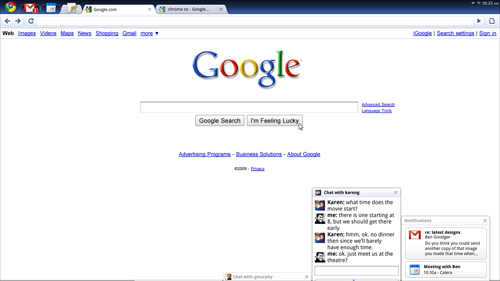This article is more than 1 year old
Google Chrome OS: unlike Android, it's open source
The code's already there. If anyone wants it
Code freeze imminent. If you want it
Judging from Hexxeh's conversations with Google developers, Chrome OS code will be frozen this week. He predicts that the first machines will be unveiled later in the month, as separate rumors have indicated. Google merely says — as it has always said — that machines will arrive by the end of the year.
These will be netbooks — and maybe tablets as well. And they'll be priced not unlike "what computer buyers expect today." But, according to Google's pitch, they'll be easier to use than the average notebook — and more secure.
Google's isn't just building a new OS. It's rebuilding the netbook itself. "We are working on the Chrome OS image — the software — but in addition to that, we are actually going and working with partners to specify components at the hardware level," Google VP of product management Sundar Pichai said last fall. "We really want software to understand the underlying hardware so we can make it much faster and more secure. It's an important part of what we're trying to do."
Most notably, Chrome OS doesn't run on hard drives. It runs on solid state devices, part of Google's effort to improve boot times. In the fall, Google showed off a Chrome OS netbook that booted in seven seconds, and by way of system firmware, it's working to reduce that time even more. As we said, the firmware is the one major part of the project that isn't "open." And considering what a large role it plays, you could argue that, in fact, Chrome OS is closed to unofficial partners. But this work may eventually be released as well.
In limiting all apps to the web and confining each app to its own sandbox, Google also claims the Chrome netbook is more secure than today's machines. And the ultimate goal is to build an OS that can verify its own integrity and reload itself if necessary. But whatever Chrome OS gains in the areas of boot time and security, it loses a few points when you consider that it can't, well, run local applications.
If you don't have a net connection, a Chrome OS machine is bit tongue tied — though Google is offering tools that let applications operate offline (up to a point). And there are still certain advantages to running local applications. "There are applications today that are not available on the web," Pichai said. "There will be some things this will not be able to do."
In an effort to shrink the gap between local apps and web apps, Google is building Native Client, a Chrome plug-in that runs native code inside the browser. But it seems that Native Client — another open source project — won't quite be ready in time for the release of Chrome OS.
In May, Pichai unveiled a working prototype of the Chrome Web Store, which will offer up web apps for Chrome and Chrome OS, and among the apps "on sale" was a version of Lego Star Wars built to run on Native Client. Earlier this fall, when we spoke to David Helgason, the CEO and co-founder of Unity, the outfit that's working with Google on the app, he indicated Native Client wasn't as far along as it needed to be. Last week, we asked him again about the progress of the plug-in, and he declined to comment.
Some would say this is no great loss. Native Client undermines Google's ostensible commitment to web standards. But the point is that Chrome OS will face an uphill battle to win converts in a world that includes so many other devices that don't artificially limit themselves to the web. Pichai says that the Chrome OS netbook will be a "second machine" for most buyers. But so is the iPad.
Unlike iOS, Chrome OS is open source. But that sells only so many machines. ®

